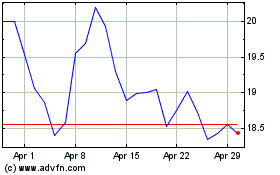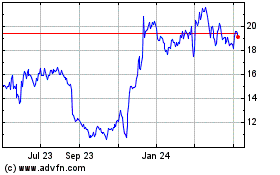Retailer Group Predicts Robust Holidays, but Sounds Warning -- WSJ
October 04 2019 - 3:02AM
Dow Jones News
By Sarah Nassauer
This article is being republished as part of our daily
reproduction of WSJ.com articles that also appeared in the U.S.
print edition of The Wall Street Journal (October 4, 2019).
Retailers expect a strong holiday shopping season, but warn that
global political and economic uncertainty could erode consumer
confidence and spending.
The National Retail Federation, which represents retailers
including Walmart Inc., Amazon.com Inc. and Macy's Inc., said
Thursday it expects holiday sales to rise in a range of 3.8% to
4.2% -- to about $730 billion -- after sales came in lower than
expected last year in the midst of a federal government
shutdown.
Retailers and consumers are feeling confident amid low
unemployment and rising wages, but the economy is growing at a
slower pace than last year and there is "considerable uncertainty
around issues including trade, interest rates, global risk factors
and political rhetoric," said Matthew Shay, president of the retail
federation.
The NRF's figures, which cover sales online and in stores from
Nov. 1 to Dec. 31 and exclude auto, gasoline and restaurant sales,
are in line with those of retail consulting firms.
AlixPartners predicts holiday sales to rise between 4.4% and
5.3% compared with last year. "While our 2019 forecast is an
upswing from last year, tariffs and the trade war are finally
beginning to take a hit on consumer confidence, and the buzz of an
oncoming recession is getting louder," the firm said in a research
report.
U.S. stocks are down in October as signs emerge that a
manufacturing slowdown has spread to other parts of the economy.
Last week, consumer spending, the driving force in the U.S.
economy, showed a slight slowdown in August. Federal data released
Thursday showed services activity in the U.S. and eurozone softened
in September. Investors and economists are watching Friday's
planned employment-data report carefully.
The NRF and retailers have long pointed to the trade war between
the U.S. and China as a potential source of economic instability,
but so far that mostly hasn't translated to higher prices for
consumers, Mr. Shay said Thursday on a call with reporters.
The Trump administration has imposed tariffs on the majority of
goods imported from China, with some to take effect later in the
holiday season on consumer goods including toys and apparel. China
also has imposed tariffs on some U.S. goods. Both countries have
offered some concessions ahead of high-level negotiations between
the countries in October. On Wednesday, the administration said it
would impose tariffs on aircraft, food and other goods from the
European Union.
"None of these retailers want to pass on cost to consumers if
they can avoid it," said the retail federation's Mr. Shay. But if
cost increases because of tariffs spread to more categories of
goods in the coming weeks and months, he said, "tariffs certainly
could make an impact."
Write to Sarah Nassauer at sarah.nassauer@wsj.com
(END) Dow Jones Newswires
October 04, 2019 02:47 ET (06:47 GMT)
Copyright (c) 2019 Dow Jones & Company, Inc.
Macys (NYSE:M)
Historical Stock Chart
From Mar 2024 to Apr 2024

Macys (NYSE:M)
Historical Stock Chart
From Apr 2023 to Apr 2024
